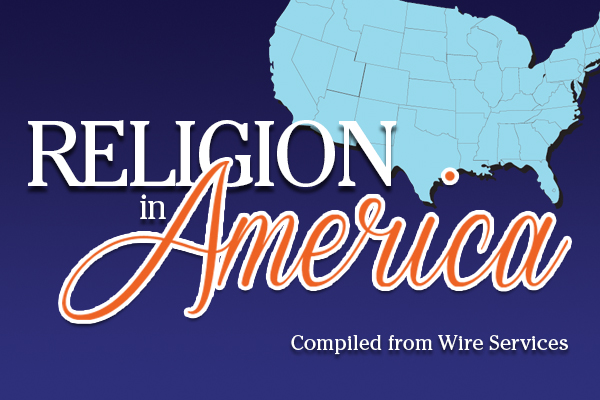When Southern Baptists need a polished spokesman to appear on “Nightline,” testify before Congress or speak for them in the Oval Office, their go-to guy is Richard Land, who heads the denomination’s Ethics & Religious Liberty Commission.
It was Land who, with other backers, stood with President Bush on Nov. 5 for the ceremonial signing of a bill outlawing the procedure he calls “partial-birth abortion” but which is known in the medical community as dilation and extraction. And it was Land who was among a few invited to linger after the ceremony, chat privately and pray with Bush.
Recently he returned to his Louisiana roots to preach at New Orleans Baptist Theological Seminary, where he earned a master’s degree in 1972 and met his future wife, Rebekah Van Hooser, in the seminary cafeteria.
Land’s topic at a seminary chapel service was Ezra 7:10, elaborated into an exposition on personal commitment that was as rounded and polished a pulpit performance as a full-time pastor’s — except it came from a figure who is part small-town preacher, part big-time lobbyist, part media figure and part public policy strategist.
To the extent that the 16 million-member Southern Baptist Convention has a public spokesman, it is Land. He articulates the denomination’s positions on issues such as abortion, same-sex unions, bioethics and race relations.
Baptist heritage
His audiences are alternately small-town Baptists or the masses who get their news from National Public Radio and The New York Times. Land has impeccable credentials in both worlds.
He is, on the one hand, genetically hardwired to be a Baptist — a sixth-generation Texan who became the first in his family to go to college. “The guys I went to high school with, they came to school with their first names over their shirt pockets,” he said in an interview.
But what an education it was: magna cum laude in history from Princeton, a master’s in theology from New Orleans Baptist Theological Seminary and a doctorate in theology from Oxford University.
Land negotiated the turmoil of Princeton in the late 1960s with his faith intact. “I remember one professor began a class asking who believed everything in the Bible was true,” Land said. “Maybe one other kid and I raised our hands. He said, ‘When we’re done with this class, you’ll think differently.’”
Land didn’t, partly because he clung to a sympathetic professor, the legendary Methodist ethicist Paul Ramsey, and partly, he said, because, “I’m not a person susceptible to peer pressure.”
But when he graduated, Land said, he was well grounded. “Princeton was pretty good for me, because by the time I finished, I knew why I believed everything I believed,” he said.
The result is a committed evangelical who can present his community’s moral and social agenda more adroitly than Pat Robertson or Jerry Falwell, two other public evangelicals who occasionally have to backtrack or amend their sometimes explosive public statements.
“What he does is bypass some of the knee-jerk stereotypes and prejudices some people might have about Southern Baptist spokesmen,” said Larry Eskridge of the Institute for the Study of American Evangelicals at Wheaton College.
“He’s reasonable, intelligent. He doesn’t seem to rile very easily. He disarms people who are looking for a stereotype and instead find this Princeton, Oxford guy who doesn’t fit in their mold.”
Land’s career path took him through New Orleans from 1969 to 1972 as a graduate student and student body president. For two of those years, he was pastor of Vieux Carre Baptist Church — then, as now, a tiny congregation that Land today likens to one of St. Paul’s early Greek churches.
“That was a real transient, nontraditional congregation,” he said. “We had a former Satan-worshiper, prostitutes — male and female — drug users, pushers. I guarantee you, my wife and I were the only people there under 30 who hadn’t used drugs.”
After graduating from seminary in New Orleans, Land collected his doctorate at Oxford. He then taught and served as a dean at Criswell College in Dallas. He was an aide to Texas Gov. William Clements in 1988 when George W. Bush, then working for his father’s presidential campaign, asked whether Land might be interested in a position in the new administration.
Land said he might take it if another job he was interviewing for didn’t come through.
But it did. What was then the Southern Baptist Convention’s Christian Life Commission hired Land that year.
Expanding borders
Land expanded its agenda, raised its profile, opened a Washington office and began bringing Southern Baptist concerns into network talk shows, congressional hearings and newspaper newsrooms.
By now, much of that is familiar: steadfast opposition to abortion and same-sex unions, to name the two most current issues.
It was Land, an authentic Baptist conservative with close personal ties to the denomination’s most conservative leaders, who helped craft Baptists’ exhortation three years ago that husbands should be devoted to their wives and wives “submissive” to their husbands.
But there is nuance, too.
Under Land, Baptists have enlarged their anti-abortion stance to include a full range of life issues, including opposition to doctor-assisted suicide — but not the death penalty.
Land was a primary force behind the denomination’s 1995 apology for its heritage of racism and support for slavery.
And while Land, like most evangelicals, supports displays of the Ten Commandments in public places, he has bluntly chastised former Alabama Chief Justice Roy Moore for his civil disobedience in refusing to remove a display of the commandments from the lobby of the Alabama State Judicial Building.





Share with others: